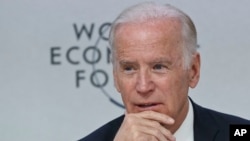U.S. Vice President Joe Biden said Tuesday that the United States would speed up the approval of promising new drug combinations in his government's newly announced drive to cure cancer "once and for all."
Biden, who lost his son Beau, 46, to brain cancer last year, set out his plans at a World Economic Forum meeting of international cancer experts in Davos, a week after being appointed to lead the initiative by President Barack Obama.
So-called combination therapy is increasingly seen as central to fighting tumors, as scientists unlock the different genetic factors driving cancer cell growth, but bringing such cocktails to market can be slow and costly.
Biden said he had hosted a meeting at his home with three unnamed large drug companies and the head of the U.S. Food and Drug Administration at which both sides had pledged to do more to get novel cancer drug cocktails to patients.
"The head of the FDA made a commitment that everybody would move much more rapidly in approving combinations," Biden said.
At the same, the pharmaceutical industry executives had all said they were "open to a different way of doing business" in order to ensure that promising drugs from different companies were tested together as early as possible, he added.
Cancer experts are particularly excited by the promise of new immunotherapy medicines that help the body's immune system fight tumors and that have been shown to work well when used alongside other drugs.
Francis Collins, director of the U.S. National Institutes of Health, described their potential as "breathtaking."
High prices
But such immunotherapy drugs are expensive — typically costing well over $100,000 a year per patient — and companies have traditionally been defensive about sharing early-stage medical experiments.
Obama's call to "make America the country that cures cancer once and for all" in the last State of the Union address of his presidency has led to criticism from some scientists of an oversimplified approach to the killer condition.
The latest government-led initiative has echoes of former President Richard Nixon's unsuccessful "War on Cancer" in the 1970s. Since then, scientists have discovered that cancer is hundreds of different diseases rather than one single disorder, making the notion of a single cure outdated.
Biden acknowledged the complexity in Davos. "I'm not naive enough to think or suggest we are going to have a cure for every cancer in the world in the near term," he said.





